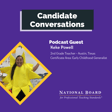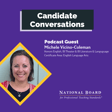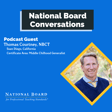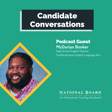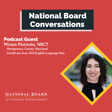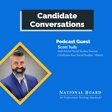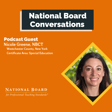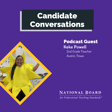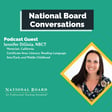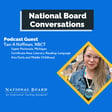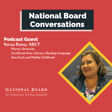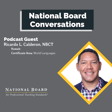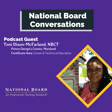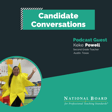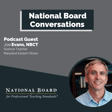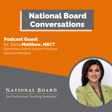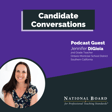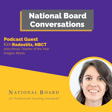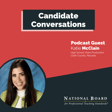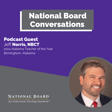Become a Creator today!Start creating today - Share your story with the world!
Start for free
00:00:00
00:00:01

Michael Ida - 2023 Hawaii Teacher of the Year
Dr. Michael Ida has had an exciting journey! He joins National Board Conversations to discuss his journey into the classroom, what keeps him returning every year, and much more!
Transcript
Introduction of Dr. Michael Eda
00:00:00
Speaker
What's up, everyone? Welcome back to National Board Conversations, a podcast highlighting the expertise of National Board Certified Teachers all over the country. On this episode, I have the honor to chat with Dr. Michael Eda. He's a National Board Certified Computer Science and Math teacher. Oh, and he won the 2023 Hawaii State Teacher of the Year. He dropped a lot of wisdom on this episode, so I won't hold you. Here's my conversation with Dr. Eda. Hey, Michael, thank you for taking the time. How are you doing today? I'm good. I'm good, Eddie. Thank you. Thank you for having me.
00:00:29
Speaker
All right, all right, we'll get right into it. So can you give us a brief intro yourself? What's your current role and where are you at? Sure, Mike Eda. I'm at Kalani High School, which is in the Hawaii Department of Education. So I've been Oahu, East Honolulu, and I'm a classroom teacher. I teach mostly now computer science. I started my career as a math teacher. I still teach one section of math, AP Calc, but the rest of my line is now really just computer science.
00:00:58
Speaker
All right. So now we got a couple of questions to get you to know a little bit outside the classroom. So what are your three favorite foods?
Cultural Influences and Interests
00:01:05
Speaker
OK, so my three favorite foods, these are kind of local foods. So these are kind of more ethnic foods. So in Hawaii, we have kind of a large Asian-American population. So a lot of my favorites are kind of Asian-American staples. So my first one is something called a Spamusubi. I don't know if you've ever heard of that, but it's kind of a it's
00:01:25
Speaker
It's like a piece of spam, which when people hear that, if you didn't grow up here, people are kind of skeptical. But it's awesome. So what you do is you fry it up, and you put it between some rice and some nori, which is some dried seaweed. And it's really good. It's a great snack. So that's my first one. If you ever make it out here, you got to try it. Listen, I've been trying to leverage our way out there. I'm like, thank you. We need to get out there.
00:01:55
Speaker
Yeah, absolutely. So that should be, and they sell it, you know, it's all over. You go to 7-Eleven, you go to any kind of convenience store, it's all there. So my second one is something called chicken katsu. So what that is, it's kind of like a chicken cutlet, chicken breast, where you kind of dip it in what's called panko flour and you fry it.
00:02:17
Speaker
but it's not quite like fried chicken. It's a lot lighter. The coating is really crunchy and there's like a dipping sauce that you have with it and it's really good. Probably the closest thing I can maybe relate to is maybe like chicken tenders, but it's different. It's kind of a little bit lighter and the dipping sauce makes it really nice. You have it with rice and it's really good. Okay. So again, there's something to put on your list if you ever get out here.
00:02:45
Speaker
And then the last one so this is my go-to so on those on those really busy days You know when you get home. You had a long day. You don't really feel like making dinner cooking something for dinner You know I'm half Korean, so this is kind of grew up on this. It's kimchi and rice just plain white rice and kimchi And you just have that you don't in no preparation necessary. You just pull it out of the fridge, and you're good to go and
00:03:09
Speaker
Um, so a lot of those busy days, that's kind of my go-to dinner is, listen, I feel that right. So I'm Puerto Rican. And one thing we eat is rice and eggs, right? Just rice and eggs, right? Simple. And I do that sometimes. And my girlfriend makes fun of me for it. And I'm like, listen, sometimes you just need like a simple meal to get you out. You ain't trying to do nothing too difficult. Yeah, absolutely. It's kind of that, that comfort food that you grew up with and that you kind of just go to whenever you're,
00:03:36
Speaker
You're tired. You had a long day. You just need something to fill you up. Yeah. All right. So what are the last three songs on your music playlist? Okay. So, uh, I am a Gen Xer. So I, I grew up in the eighties. Uh, so on my playlist, uh, the last three songs that I've got are all seventies and eighties music. So I've got the B 52s.
00:03:57
Speaker
Uh, I've got Whitney Houston and I've got Bon Jovi. And then the one sports team that has your heart. And if you're not a sports person, a movie, you can recite line for line. Sure. Sure. So, um, I guess I would describe myself maybe as a very, very casual sports fan. Okay. But you know, when I did.
00:04:22
Speaker
I was fortunate enough to go away to school. Um, so I went to Northwestern University in Chicago and that's where I really, that's where I first experienced, uh, live baseball, the Cubs, uh, North side. So, you know, some, yeah, some friends took me to, you know, some live games, uh, at Wrigley. And, uh, it's, it's a really nice way to, I found that it's a really nice way to spend an afternoon, especially in the spring, you know, once, you know, the spring starts.
00:04:51
Speaker
And, you know, kind of winter recedes. And it's, you know, so I guess I would say I have Chicago. That is a big difference, man. Yeah. It was, you know, the first time I saw snow the first time you see it, because, you know, I never I've never seen it before. And wow, this is amazing. And, you know, when it, you know, once you get into winter, it's kind of sticks around and it turns when you start living with it. Yeah, it is. Yeah. Yeah.
00:05:20
Speaker
But I guess I would say the Cubs. OK, I like it. And they won a World Series not too long ago. They did. Yeah. Yeah. Like wait so long to be like gratified. Like nice. Yeah. Yeah. All right. All right. Now back to your story in the
Journey to Teaching and Board Certification
00:05:34
Speaker
classroom. Can you share why you became a teacher? Sure. Sure. So I think teaching is in my DNA. So my mom is a teacher and I had several aunts and cousins who were teachers.
00:05:46
Speaker
It was always kind of in the back of my mind that I would eventually become a teacher. And in high school, I had this one math teacher. He was my calculus teacher. And he was a character. I mean, he was a really big personality. He had us mesmerized from the start of class to the end. And he had some high expectations. His was the first class where I got
00:06:16
Speaker
I mean, the first test we took, I got an F. But, you know, I mean, that can either that can go two ways, right? You can you can either kind of crush you or it can, you know, OK, I got to do better. And so his personality was such that, OK, you got to do better. You got to step it up. And so that really had kind of a formative effect on me. And, you know, so I went to I went to school. I went to I went to graduate school. And then when I got out of graduate school, you know, the job market wasn't great.
00:06:46
Speaker
Uh, and so I thought, okay, this is the time I'm gonna, I'm gonna, you know, I gotta make the switch. I'm going to go into teaching. Uh, and so, uh, made the switch and, you know, haven't, haven't never looked back. I mean, it's been a great run. And now you're national board certified and we love you for it. Sure. So what pushed you to pursue board certification and what was your journey like? Did you achieve on your first try? No, I didn't. Um, you know, so I.
00:07:10
Speaker
first got certified in 2004. Um, so it was relatively, I did, I got the, I got the cardboard box and you know, it was even the era of VHS tapes. So yeah. Um, so it was initially for me, it was kind of curiosity because, um, you know, it was relatively new at the time. And I remember, I think it was like 1999, um, you know, first, you know, the first teacher in Hawaii who was, who got certified, he was kind of in the news, there was some news about him.
00:07:39
Speaker
And so I saw that and I thought, hmm, okay, that looks interesting. Let's take a look at that because at that point I was kind of in the stage in my career where I was, you know, beyond kind of the first year teacher, the rookie stage. And, you know, I mean, kind of looking for, okay, what's next? You know, where can I go from here? What's the next challenge? And so I heard about that and we kind of took a look at that. And okay, maybe I'll give this a try. First time, didn't quite make it.
00:08:07
Speaker
But, you know, the second time, okay, second time was able to get that. And that was in 2004. And so that was, like I said, that was the era of the box. I don't know if the younger teachers out there will know what the box is, a cardboard box. Yeah, we had to snail mail it. We had to send it through the mail. You know, we had the, like I said, the VHS tape. So, you know, it was that kind of that era. But, but yeah, I mean, so initially for me, it was curiosity.
00:08:35
Speaker
But, you know, once I kind of got into the process, I saw, oh, OK, so this is it's really got a strong structure to it. It's really got it's well thought out. And so, yeah, I've been on board ever since. So what was the most helpful coaching conversation resource or piece of advice you received while you were going through the process? I think it was, you know, there was a colleague of mine who she did it a couple of years before me.
00:09:03
Speaker
And, you know, I was going through the process and I thought, you know, when I first, you know, signed up to do it, I think like a lot of people, we didn't quite realize, you know, the magnitude of the process. So I was going through it. I thought, oh, wow, you know, I don't know if I can do this. But she was kind of moral support. I mean, she had gone through it. And so she, you got to stick with it. You got to, you know, just get through it. When I, you know, thought about giving up, she was there. And so it was,
00:09:32
Speaker
It was really just kind of the, the, the comfort of having somebody who had done it before and encouraging me to just keep going, which was kind of really helpful. So how did becoming an NBCT impact your career? Um, I think for me, there's a couple of things I think, you know, one is it kind of opens doors for you. I mean, as a professional, if you got the NBCT,
00:09:57
Speaker
There are certain opportunities that you have access to that you might not have, you know, as just a, you know, without board certification. But I think the other thing for me is that it kind of provides you, you know, the spiral. It kind of provides me with a structure and a scaffolding for thinking about, you know, as you go forward in your career, no matter how many years you have,
00:10:22
Speaker
this is, you know, a structure that you can use to help you think about continuous improvement. And I think for me, that has been the most useful is, okay, how do I, you know, how do you keep improving? How do you not get static? Because I think for a lot of teachers, once you get kind of that, you know, that mid-career, you know, teens and 20s years of experience, then
00:10:44
Speaker
I think for a lot of folks, there's sometimes the temptation to, okay, I've set, I got my lessons, I'm all set, let me just kind of coast to retirement. But for me, that has provided me with kind of a way to think about, okay, how can we keep moving forward? And for me, so for me, that's really been kind of the most useful thing about it. So yeah, on that track of you get kind of stuck, you think about leaving, what keeps you in the classroom?
Passion for Teaching and Student Engagement
00:11:10
Speaker
Um, I think for me, it's, it's just the interaction with the kids. Um, you know, every day, the thing about teaching is, and I'm sure you know this every day is different. Um, it's not like an office job or, you know, nine to five, you just come in and do your thing and you go home. Every day is different. You got to challenge every day. Um, and sometimes it can be tough, but a lot of times it's the most rewarding thing you can think of. And, you know, I don't think I've ever laughed so much as I have in teaching, you know, going to school, whatever. I mean, it's.
00:11:39
Speaker
It's just a riot. I mean, it's the time goes by. And, you know, when I first started, you know, for a second year, I thought, wow, retirement, that's so far in the future. But now, you know, you get 25, 26, 27 years and you think, wow, time flew. Where did it all go? I mean, here we are. But I still got plenty of years in me, I think. I love to hear it. So you're a computer science teacher.
00:12:06
Speaker
Yes. So I'm sure you can get pretty creative with the stuff you can do. What are some of your favorite lessons to teach? I think my favorite lessons are something that helps kids see things in a different light. And you think, oh, OK, computer science and math, it's just formulas and whatever. But there's one in particular I think that really, when it opened kids' eyes, it really kind of
00:12:34
Speaker
I thought, wow, this is really neat. This is what it's all about. And when we're designing websites, one of the things that you think about is you want to make sure that it's accessible for folks with maybe visual impairments or what have you. And one of the exercises that I've had my kids do is there is a site where you can kind of run your site through this kind of simulation of people who have, say, color blindness, different types of color blindness.
00:13:03
Speaker
And so you can see what your site looks like through their eyes, you know, the different kinds of color blindness and that, you know, I mean, that's something that a lot of people don't normally think about, you know, okay, yeah, the color scheme is nice and it's all good. But when you see it through somebody else's eyes and you see, oh, okay, it's so that contrast is actually a little bit hard to read for those folks.
00:13:25
Speaker
It kind of really makes you see things differently. And for, you know, for some kids, it's wow, it's kind of eye opening. And so things like that, you know, getting kids to see things from a different perspective, even if it's like a small thing like that, you know, for me, that's kind of what it's, you know, really when you feel when you feel you feel really good as a teacher. That
Expansion and Impact of Computer Science Program
00:13:46
Speaker
sounds cool, man. So you started the computer science program at your school. Have you seen the program expand from the beginning until now?
00:13:55
Speaker
Yeah. So, you know, in the beginning we had just a couple of sections, you know, I think kids were kind of not sure what to expect. You know, we had your typical clientele, you know, kind of the robotics kids who needed to learn coding and, you know, the code is hard. Like in college, we have to do like a little coding thing for like, for like a graph.
00:14:17
Speaker
Uh-huh. Like to overlay on a map. Oh my goodness. I was like, I don't know how people do this for like, I was like, there's so much here, but that's a lot. Sure. Sure. Yeah. And so, you know, I mean, we started with just a couple of sections. So now we've grown to, we got, you know, a couple of intro sections. We got some AP sections. Um, you know, we got our club. So there's, you know, there's a, you know, kind of strong steady interest in it. Um, and.
00:14:47
Speaker
From kids who are not, you know, you're stereotypical, you would think, coders, you know, kids who are interested in, you know, digital art or kids who are interested in, you know, storytelling or things like that. So it's kind of a, it's kind of neat to see the kind of cross mixing when you have, you know, your typical STEM kids mixing and talking and interacting with, you know, kids who have other interests. And that's that kind of cross-pollinization.
00:15:12
Speaker
that's, I think, really powerful, and especially in something like computer science, where it's, I think it's something that, you know, especially going into the future, that, you know, we don't want to just leave that to a small niche of people. We want, you know, everybody to be able to have some input and some perspective and a say in that. Because I think, you know, everything that we think about in the future, all of our challenges that we're facing, there's going to be a technical
00:15:39
Speaker
there's a strong technical aspect to how we're going to solve them or what the challenge is. And so we're going to need all kinds of people to help us out in the future. And that's what we're looking for with the program. Yeah. And I think with the, like you spoke on it, through going into the future, things are just going to get more and more digital. Sure. Yeah, yeah, yeah. We're going to need more types of people to be able to just troubleshoot. Absolutely. Just troubleshoot, simple troubleshoot. Absolutely. Yeah, yeah, yeah.
00:16:09
Speaker
Because if you have people with just one very narrow perspective, even though they may be very high-optitude in that one area, there's blind spots. We all have blind spots. And if we can't come together and share our perspectives, then we're going to have a limited future. And so we want to make sure we include everybody.
Recognition and Role as Teacher of the Year
00:16:34
Speaker
Exactly. So you recently won Hawaii 2023 Teacher of the Year. Congratulations, by the way. Thank you. Thank you so much. Thank you. How did it feel when it was announced that you won? Like, I'm sure it was like super exciting. What happened? It was surreal. I mean, you know, they were, you know, the way they do it here in Hawaii, they have we have our complex areas, which are kind of like smaller organizational units. And we have teachers of the year from each complex. And then
00:16:58
Speaker
have the state level and you know we had a there was a ceremony at the governor's mansion uh where they kind of announced the winner and i was convinced that you know it wouldn't be me and so you know when i heard uh my name i was it i wasn't quite i i thought okay looking around oh okay where's where's that person but um but you know it was really surreal and i still described to people it still hasn't really sunk in i mean it's
00:17:25
Speaker
uh, you know, I mean, intellectually you kind of understand that, okay, you have this distinction, but, um, you know, kind of in your gut, I still, you know, it's still kind of surreal. Um, but it's still, you know, I'm starting to understand, you know, you have a responsibility as well, you know, you're representing the people of your state. And so, you know, I want to make sure that I do a good job with that. Um, but it's, it's, you know, surreal. I mean, like I said, it's still kind of still sinking in.
00:17:53
Speaker
That's awesome. Again, congratulations. I'm so happy with you. Thank you so much. So if you had to sell the teaching profession to someone looking to get into it in one to two minutes, what would you use as your elevator page?
Inspiration and Role Model Stories
00:18:08
Speaker
I think I would say my tagline would be become a teacher, be somebody's hero. Hero not in the sense of a superhero. You're in a public view, but in the sense that
00:18:21
Speaker
Yeah, I'll share with you a story that I think kind of encapsulates this. I think people, if you spend any time with me, you'll see that I have a visual impairment. So I was born blind. And so I had a couple of surgeries in the first six months of life. And still my vision is still kind of impaired, not able to drive or do kind of some major life things. And so when I was doing my student teaching,
00:18:47
Speaker
As with a lot of people, that's where you kind of make your huge mistakes. And I remember one day I was making all the regular rookie mistakes. I'd gotten in a power struggle with a kid that's public, all the things that you're not supposed to do. And so I was talking to my teacher at the end of the day. And one of the things that she said to me is, I notice that you hold the book close to you when you read.
00:19:14
Speaker
And I thought, OK, on top of everything else, this is probably going to be the nail in the coffin. She's probably going to say, with all that, I don't think this is a right career for you. So I was getting ready for that, for the hammer to drop. So I explained to her, I have a visual impairment, all of that. And what she said to me was that it's OK because kids need all kinds of role models.
00:19:43
Speaker
And that, for me, that kind of said it all. As teachers, you're going to be somebody's hero. You're going to be a role model for somebody. And we need you in the profession. And so if you want a career where every day is different, where it's going to challenge you to your utmost, but you're going to feel so good at the end of the day, go into teaching. You're going to be somebody's hero. We need you.
00:20:10
Speaker
That was amazing. Thank you. That was really cool. So who was your favorite fictional TV movie TV or movie teacher? You know, as a math teacher, everybody expects you to say, you know, stand and deliver. I'm going to take a little different, you know, have a little different one. So this is going to be referring again as a Gen X or referring to the 80s. So cut out a kid, the original.
00:20:39
Speaker
Okay. Ralph Macchio. Um, so my, I guess I would say Mr. Miyagi, Pat Morita. He was, he was kind of, he kind of was my favorite teacher. Um, I, you know, my grandfathers, both on both my mom's and my dad's side, my father, my grandfathers, uh, both died before I was born. So I never knew my grandfather, but I always imagined my grandfathers were like Mr. Miyagi, Pat Morita. I always imagined.
00:21:08
Speaker
That's my grandfather. Hey, listen, it's really cool. So we have a feature on the podcast called
Recommendations and Social Media
00:21:17
Speaker
the shoulder tap. When you give a tap on the shoulder to some, to someone to let them know they're ready to become national board certified on here, give them a quick shout out and we will encourage them to go through the process when we tweet out this episode. So who are you shoulder tapping?
00:21:32
Speaker
I am shoulder tapping, so I have a colleague. She teaches at a different school, but she's a real good friend, a fellow math teacher. Her name is Daphne Okunaga. She teaches at Pearl City High School in Hawaii. So I would shoulder tap her as being somebody who's a great candidate for board certification. All right, all right. And where can the people find you on social media? So you can find me, Instagram, Twitter.
00:21:59
Speaker
and a little bit of Facebook. So my handle is Dr. Mike Eda, D-R-M-I-K-E-I-D-A on all three. All right, all right. Dr. Mike Eda, thank you so much for joining me. Yeah. Thank you so much, Eddie. It's been a pleasure. Thank you.
00:22:17
Speaker
Dr. Edie is awesome. He wrote a blog for us recently that I will post in the show notes if you want to take a read. I want to thank him again for taking the time to chat with me and thank you for taking the time to listen to National Board Conversations. Be sure to follow us on social media all over the place, Facebook, Instagram, Twitter, wherever you need to. For any all news, National Board related, and we'll see you next time.
